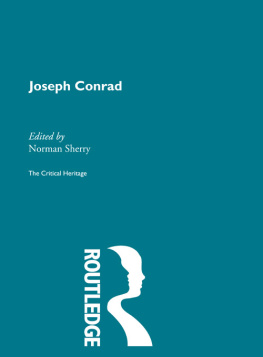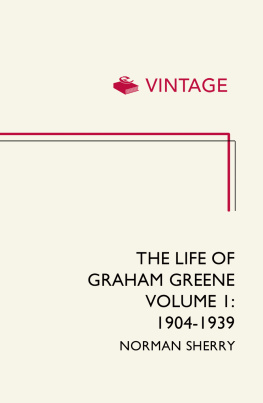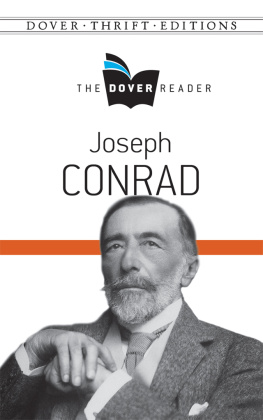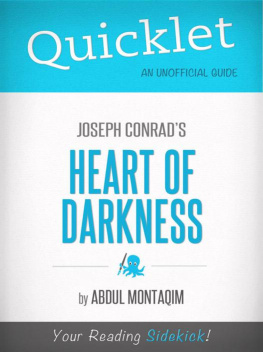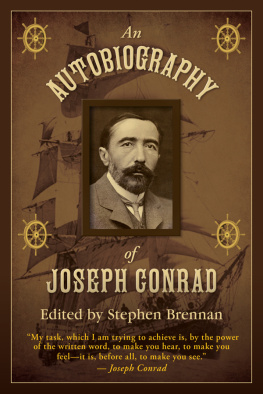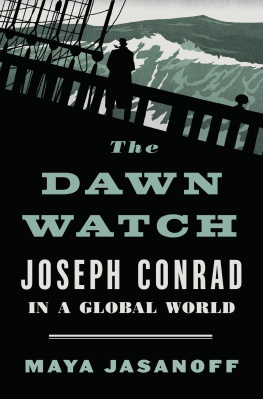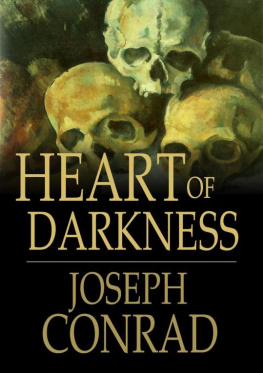Norman Sherry - Joseph Conrad: The Critical Heritage
Here you can read online Norman Sherry - Joseph Conrad: The Critical Heritage full text of the book (entire story) in english for free. Download pdf and epub, get meaning, cover and reviews about this ebook. year: 1973, publisher: Routledge, genre: Art. Description of the work, (preface) as well as reviews are available. Best literature library LitArk.com created for fans of good reading and offers a wide selection of genres:
Romance novel
Science fiction
Adventure
Detective
Science
History
Home and family
Prose
Art
Politics
Computer
Non-fiction
Religion
Business
Children
Humor
Choose a favorite category and find really read worthwhile books. Enjoy immersion in the world of imagination, feel the emotions of the characters or learn something new for yourself, make an fascinating discovery.
- Book:Joseph Conrad: The Critical Heritage
- Author:
- Publisher:Routledge
- Genre:
- Year:1973
- Rating:3 / 5
- Favourites:Add to favourites
- Your mark:
- 60
- 1
- 2
- 3
- 4
- 5
Joseph Conrad: The Critical Heritage: summary, description and annotation
We offer to read an annotation, description, summary or preface (depends on what the author of the book "Joseph Conrad: The Critical Heritage" wrote himself). If you haven't found the necessary information about the book — write in the comments, we will try to find it.
Joseph Conrad: The Critical Heritage — read online for free the complete book (whole text) full work
Below is the text of the book, divided by pages. System saving the place of the last page read, allows you to conveniently read the book "Joseph Conrad: The Critical Heritage" online for free, without having to search again every time where you left off. Put a bookmark, and you can go to the page where you finished reading at any time.
Font size:
Interval:
Bookmark:
Ehrsam, Theodore G., A Bibliography of Joseph Conrad (1969): the most complete checklist of writings on Conrad.
Gordan, J. D., Joseph Conrad: The Making of a Novelist (1940): particularly chapters v and vi dealing with the reception of Conrads early stories and his reaction to it.
Lohf, Kenneth A. & Sheehy, Eugene, P., Joseph Conrad at Mid-Century: Editions and Studies, 18951955 (1957).
First published in 1973
Reprinted in 1997 by Routledge
2 Park Square, Milton Park,
Abingdon, Oxon, 0X14 4RN
&
270 Madison Ave,
New York NY 10016
Transferred to Digital Printing 2006
Compilation, introduction, notes and index 1973 Norman Sherry
All rights reserved. No part of this book may be reprinted or reproduced or utilized in any form or by any electronic, mechanical, or other means, now known or hereafter invented, including photocopying and recording or in any information storage or retrieval system, without permission in writing from the publishers.
British Library Cataloguing in Publication Data
ISBN 0-415-15907-5
No novelist has yet annexed the island of Borneoin itself almost a continent. But Mr. Joseph Conrad, a new writer, is about to make the attempt in a novel entitled Almayers Folly, which Mr. Unwin will publish. Mr. Conrad says that he combines the psychological study of a sensitive European living alone among semi-hostile Arabs and Malays with the vivid incidents attaching to the life of pirates and smugglers A merely sensitive European has no business among the semi-savages of Borneo. What you want is an unbounded, reckless hospitality to all sorts of impressions. However the story is praised by those who have seen it in manuscript. The author is intimately acquainted with Borneo and its people. The physical setting of his story is as picturesque as the world offers. The Europeans closest friend is an ex-pirate, and the reassertion of the old savage instinct in the pirates lovely daughter an atavistic fit, if that be not too rude an expressionis one of the chief incidents of the tale. The book is to be included in Mr. Unwins Library of Six Shilling Fiction.
This is the only occasion on which Conrad was referred to as Dr,
Dr Joseph Conrads story, Almayers Folly, is a remarkable book, which will probably attract all the more attention because its authors name is new to readers of novels, and because its scene of action lies in regions as yet little, if at all, visited by novelists. It follows the career of a mana Dutchmanwho had gone out young to Macassar to trade.
[a summary of the plot is given]
The story is powerfully imagined, and wrought out with a fine unity of effect which colours the whole book with pathos; while the pictures of Malay life, and of the characters of slave, trader, and Rajah, are done with a skill drawn, if not from an intimate experience of life in Borneo, then from a great gift of imagination. The story is a sad one; but it has nothing depressing in its sombreness. It will be read by many with interest and admiration for its own merits; and every one who reads it will look with hopeful anticipations for the future productions of its authors pen.
Review entitled White Man and Brown.
Let us begin by acknowledging Mr. Conrads main triumph before proceeding to criticism: he has written a short novel, with scene pitched in a far foreign land, with foreign characters, about which the majority of people have only the vaguest ideas, and he has not for one moment caused us to wish that his pictures and his plot had been nearer home. He is a man who can write of Borneo and never bore, if so frivolous a phrase, used in honest and deserved compliment, do not offend him. The few Malay words sprinkled about his pages set up none of the feeble irritation that most foreign tongues, used as local colour, are apt to do; they have the piquancy of capsicums in a curry. Mr. Conrad, like many another novelist, is content with an idea rather than a plot, and he is well advised. His idea is of one white man, a Dutchman, with the sensitive, nervous temperament of the West, a dreamy lack of initiative and will-power, condemned by circumstances to dwell in a native settlement upon a Bornean river, his only companions, besides his native wife and his half-caste daughter, the strange Eastern beings realised, with one exception (Babalatchi, the Comic Opera Minister) very perfectly and with great apparent ease. The ever-failing fortune of this man, Almayer; the savage hatred for him of his Malay wife; the half-hearted affection of his daughter; and the consistent treachery of every other creature towards him, save the hero, a Rajahs son, Dain Maroola, form the thread of the story. Dain and Nina, the daughter, are lovers, and the author rises to scenes of considerable power and passion in telling their story; a story which makes one feel that the old notion of hero and heroine may still have some excuse, that there are still novelists who can breathe life into the old ideals of love and bravery. But Mr. Conrads claims to be read rest not only upon his finely conceived and simply executed love-scenes; he essays and succeeds in a subtler task when he shows the emasculating and despair-breeding effect of the tired but scheming East upon a weak neurotic Western organisation. This is done in no set piece of description, but the knowledge of it is built up in the readers mind by a hundred touches, small in themselves. Mr. Conrad has also the art of creating an atmosphere, poetic, romantic. He tells, as only one who has seen it can, of the creeping decay of house and boat, stage, balcony, and building; he makes one know the warm moisture that slowly rots, as readily as he makes one feel the inertia that fails ever to repair or reconstruct.
The scenery does not appear behind the characters like the back cloth at a theatreit mingles with them to the end that one may know they would not have been what they were had the white fogs not risen nightly from the river. The lush green backgrounds of poisonous jungle; the broad waters, slapped with tropic rain or gleaming in miasmic moonlit mist; the swift dark canoes, shooting noiselessly on errands of love and hatred; the slump of the sullen alligator seeking the streamall this is not a setting of the story, it is as much the story as the human interest. To say this is to say much; but we have been struck with the book, and know nothing quite like it of recent years. It is slight and short enough, but gives evidence of abundant stores of material in the authors possession. Mr. Conrad may go on, and with confidence; he will find his public, and he deserves his place.
Arthur Waugh (1866-1943), English literary critic and editor, and chairman (1926-36) of the publishing house of Chapman & Hall. The notice is an extract from his London Letter.
The parochial spirit in fiction has extended to Borneo, a tract hitherto untouched by the novelist, but now annexed by Mr. Joseph Conrad, a new writer, who sets forth this week under the aegis of Mr. Fisher Unwin. I have read Almayers Folly, the story in question, and can easily credit the publishers note, which declares that the author is intimately acquainted with Borneo and its people. The book has more than the qualifications of a volume of travel: it understands, not only the scenery, but the inhabitants. The tragedy of it lies in the revolt of the half-savage daughter of a Europeanhimself the husband of a Malayto the passions of her mothers people. The European has hoped to educate his daughter and make a reasonable creature of her: she is all he has to care for in the world, and she elopes with a Malay. There is certainly material for fiction in Borneo, and, although Mr. Conrad is far from being a master of his art, and tells his story with plentiful circumlocution, he has hit on a strong motive, and he knows something of human nature. The only hope is that the wily brotherhood of novelists, hunting about for new material, may not suddenly involve us in a torrent of Bornean fiction. If Mr. Conrads book has the least success, that, in the light of experience, will be the logical sequence.
Font size:
Interval:
Bookmark:
Similar books «Joseph Conrad: The Critical Heritage»
Look at similar books to Joseph Conrad: The Critical Heritage. We have selected literature similar in name and meaning in the hope of providing readers with more options to find new, interesting, not yet read works.
Discussion, reviews of the book Joseph Conrad: The Critical Heritage and just readers' own opinions. Leave your comments, write what you think about the work, its meaning or the main characters. Specify what exactly you liked and what you didn't like, and why you think so.

